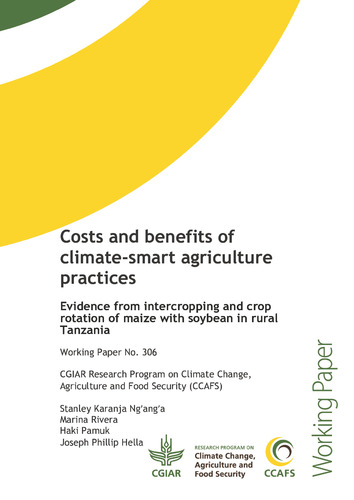Costs and benefits of climate-smart agriculture practices: Evidence from intercropping and crop rotation of maize with soybean in rural Tanzania
Climate change will adversely affect agricultural production for small-scale farmers in developing countries. Many policy initiatives advise the use of climate-smart agriculture (CSA) practices to improve the adaptation of the farmers to the climate and reduce the adverse impacts of climate on agricultural production. Among others, the profitability of investing in agricultural practices is a significant factor that influences the adoption of agricultural practices among farmers in developing countries. Are CSA practices profitable for small-scale farmers in developing countries? We address this question by investigating the profitability of CSA practices in rural Tanzania. We conduct a cost-benefit analysis (CBA) in Iringa rural district in Tanzania for four CSA practices involving crop rotation or intercropping maize with early or late-maturing soybean varieties. Our findings show that CSA practices are financially profitable for those farmers. Investments in crop-rotation practices have higher net present values, internal rates of returns, and shorter payback periods when compared to intercropping. We do not find any differences in the profitability of early and late maturing seeds. Our robustness checks show that almost all our study population can make a profit from investing in those practices. However, the profitability of those practices depends on market interest rates (discount rates), labor cost, and maize prices. These findings imply that investments in CSA practices, such as crop rotation and intercropping of maize with soybean, have positive returns in short periods. These short payback periods make crop rotation with soybean a profitable investment option for small-scale farmers in rural areas with limited financial power. Policymakers can support the use of CSA practices and design instruments to upscale the adoption of those practices, especially in rural Tanzania and in similar contexts.

